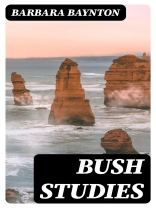Barbara Baynton’s ‘Bush Studies’ is a seminal collection of short stories that offers a stark portrayal of life in the Australian bush during the late 19th century. Written with a raw and unflinching literary style, Baynton’s narratives challenge the romantic notions often associated with rural Australia. Her vivid descriptions and masterful command of language transport readers into a world marked by hardship, resilience, and the complex interplay of gender and landscape. The stories explore themes of isolation, survival, and the often brutal realities faced by women, positioning them within the broader literary context of Australian realism and feminist literature. Barbara Baynton, an influential yet frequently overlooked figure in Australian literature, was born in 1857 and spent her formative years in a remote rural environment. This personal background informed her writing, as she drew inspiration from her own experiences of the harsh and unforgiving bush life. Baynton’s unique perspective as a woman navigating a male-dominated landscape empowers her storytelling, allowing her to convey the emotional and physical struggles of her characters with authenticity and depth. ‘Bush Studies’ is essential reading for those interested in the intersections of gender, geography, and societal expectations. Baynton’s powerful prose and poignant insights invite readers to reconsider the narratives surrounding women’s experiences in the Australian bush, making this collection not only a significant literary work but also a crucial commentary on historical and social issues that resonate to this day.
Mengenai Pengarang
Barbara Baynton (1857–1929) was an Australian writer, acclaimed for her penetrating short stories that challenged the romanticized bush myth of outback Australia. Born Barbara Jane Lawrence in Scone, New South Wales, her personal experiences of hardship in the bush and two challenging marriages deeply influenced her writing. Unlike her contemporaries who celebrated the bushman’s heroism, Baynton’s work often foregrounded the bleakness and brutality of rural life, particularly for women. Her most celebrated work, ‘Bush Studies’ (1902), is a collection of short stories that stand out for their dark realism and psychological complexity. These stories present a stark contrast to the works of her peers, such as Banjo Paterson and Henry Lawson, who coined the bygone era’s bush ethos. Baynton’s narratives are remarkable for their use of vernacular speech and vivid portrayal of isolation and endurance. Her literary contributions provide an indispensable corrective to the Australian bush heritage by showcasing the stark and unvarnished truths of outback life. Despite her significant role in Australian literature, Baynton’s work did not gain considerable recognition until decades after her death. Recent scholarship has begun to properly situate Baynton within the canon of Australian literature, recognizing her unique voice and insightful critique of bush life. Her work, though not voluminous, has cemented her place as a pivotal figure in the Australian literary landscape.












